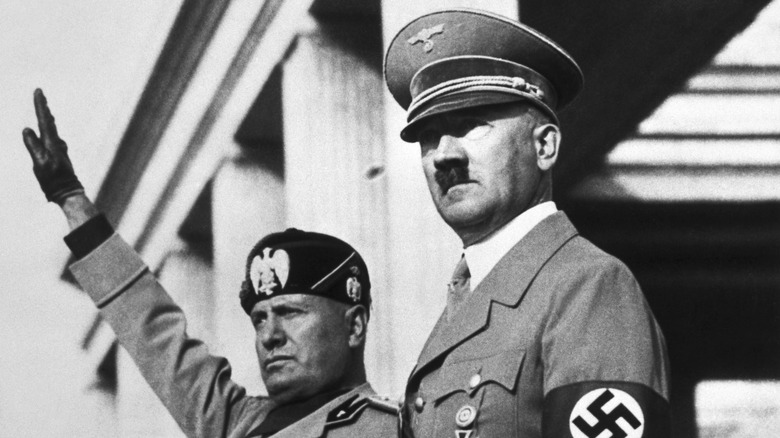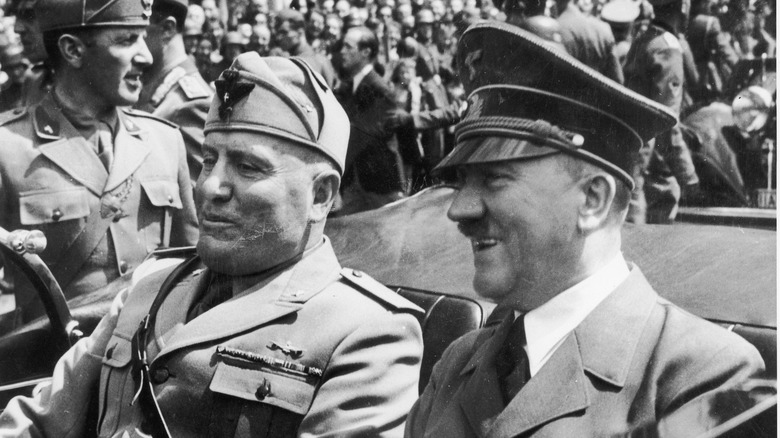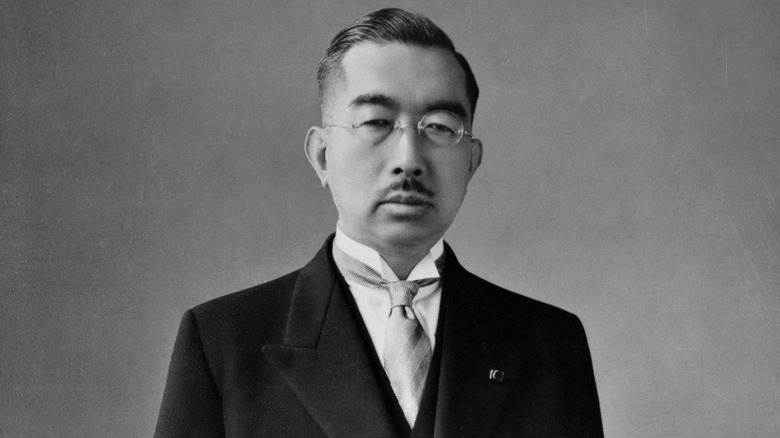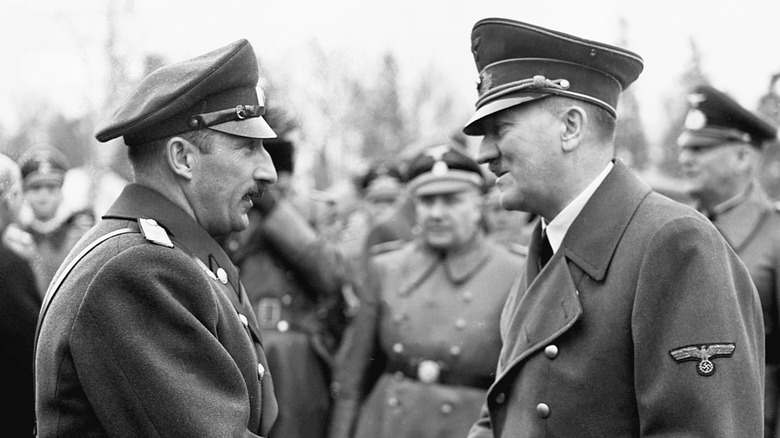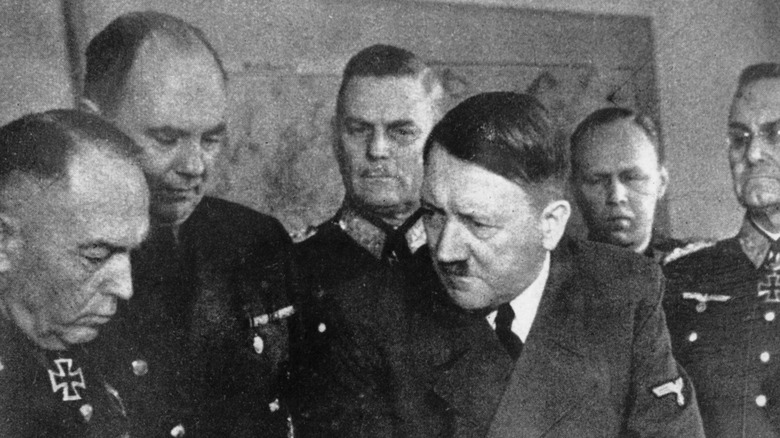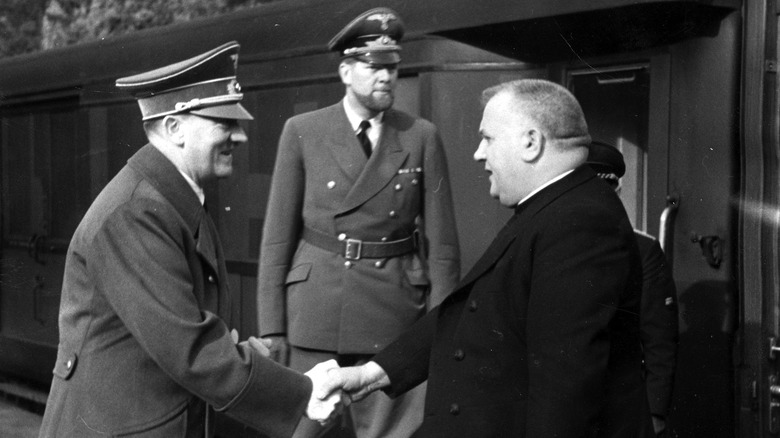Here's What Hitler Really Thought Of The Other Axis Power Leaders During World War II
In some ways, it's surprising that there's still anything to learn about Adolf Hitler and World War II Germany. We're practically drowning in countless online articles, documentaries, historical retrospectives, cultural references in movies, books, comics, and more. "Nazi" has even become shorthand for, "I don't agree with you." But amidst all the crude reductions or easily regurgitated info there's still a lot to learn. Case in point: The Axis powers weren't just Germany, Italy, and Japan. At some point, they included Bulgaria, Croatia, Romania, Slovakia, and Hungary, too.
Some of these countries worked willingly with Nazi Germany, like Bulgaria and its leader, Boris III – at least at first. Some, like Slovakia under Josip Tito, rose up against German influence and rebelled in 1944 one year before World War II ended. Others, like Emperor Hirohito of Japan, remained distant allies who worked in parallel with Germany but didn't closely collaborate. Italy's Mussolini, meanwhile, worked hand-in-glove with Hitler and wielded other countries like Croatia as a puppet state.
In each of these cases, you can be sure that Adolf Hitler himself had firm opinions about the leaders of other Axis countries. Oftentimes his opinions of individuals conformed with his opinions of various ethnic groups and how grand, noble, or "Aryan" a country's people were. In some cases Hitler seemingly liked certain leaders on a personal, face-to-face level. And at least in the case of Japan, he respected Hirohito because he considered the Japanese an equivalently ancient, powerful people with a deep history, like Germans.
Hitler greatly admired Italy's Benito Mussolini
Out of all the foreign leaders whom Adolf Hitler knew and/or worked with during his time as German chancellor, then Führer and dictator, Hitler legitimately admired Mussolini. Mussolini was Europe's OG fascist, a 20th-century strongman of celebrity and military might whom Hitler considered worthy of emulation. Hitler followed Mussolini's blueprint practically point for point.
Alpha History says that Hitler especially liked Mussolini's Fascist Party's "march on Rome." This military power grab made Mussolini "Il Duce," aka, "The Leader" of a new, Italian king-backed government. Mussolini had been gaining power for years amidst the economic shambles of World War I, amassing authoritarian control under the guise of revolutionary appeal. Starting as the editor for the newspaper of Italy's Socialist Party, "Avanti!" ("Forward!"), Mussolini fell in with fascists who broke off from the political left and who advocated a strong, centralized state. In 1921 Mussolini was elected to the Italian parliament's Chamber of Deputies, and the following year he marched on Rome.
Adolf Hitler followed a parallel track, getting involved in politics during Germany's difficult post-World War I era, rising to power through rhetoric, personality, and a message appealing to the German public. Then, he invaded Poland. Mussolini, however, considered Hitler lowbrow, "coarse," and "simplistic," per Alpha History. He also thought Hitler's views on Aryan supremacy were ridiculous considering Italy's ancient Roman past. Nonetheless, the two formed their Pact of Friendship and Alliance in 1939, which segued into their World War II alliance.
Hitler never met Japanese Emperor Hirohito
Adolf Hitler's relationship with Japanese Emperor Michinomiya Hirohito was very different from his relationship with Italian dictator Benito Mussolini. Hitler never met Hirohito and knew very little of him or Japan except what narrow, distorted vision of the country he had via Bavarian officer Karl Haushofer, who'd stayed in Japan from 1908 to 1910. As National World War II Museum explains, Haushofer analogized Japan to Germany by focusing on samurai martial prowess with a bit of geisha and Shinto beliefs on the side. This is why Hitler viewed Japan and Hirohito as kindred, distant spirits.
In September 1940, Germany, Italy, and Japan signed their Tripartite Pact that called for military support from the others for 10 years. Japan had set out on imperial conquest of its regional neighbors in 1937, and by 1941 attacked the United States at Pearl Harbor. Per Military History Now, Hitler was "ecstatic" at the news, believing that the attack had saved the German war effort. But, because Japan wasn't "Aryan," Hitler created a convoluted rationale for the nation's success at modernizing, saying that it had "Aryan origin" and that its "ultimate foundation will be Hellenic spirit and Germanic technology, just as much as in Europe," per the National World War II Museum.
The closest Hitler came to meeting Hirohito was through General Tomoyuki Yamashita, who headed up a convoy to Germany in 1940. Yamashita spoke well of Hitler in public, citing similarities between German and Japanese militarism and national goals. But privately, Yamashita said that Hitler "seems much more like a clerk," per History.
Hitler and Bulgaria's Boris III had an ambivalent relationship
The relationship between Adolf Hitler and Bulgarian King Boris III was as ultimately ambivalent as Germany and Bulgaria's relationship during World War II. On one hand, Bulgaria allied itself with Axis powers in March 1941 out of a desire for territorial expansion. It didn't have the military might to expand itself but rather used Germany for its own ends in the same way that Germany used Bulgaria as a staging point to attack Yugoslavia and Greece. In exchange, Bulgarian forces were allowed to occupy parts of Yugoslavia, Greece, and Serbia. On a whole, as Warfare History Network explains, Hitler and the "quiet, shy, but unflappable" Boris III worked together out of mutual convenience, not amity.
But, like any deal with the devil, it seems like Boris III came to regret his alliance with Germany. Even though Bulgaria instituted German-led policies that restricted Jewish rights, it didn't outright kill or even deport Jews. However, by 1943, it couldn't avoid deporting Jews under threat of German power, per the United States Holocaust Memorial Museum. While many of those Jews died in German-occupied territory, the Times of Israel states that Bulgaria nowadays regards Boris III as a hero who quietly worked to save about 50,000 Jewish lives.
Boris III blew up at Hitler in a meeting in 1943 and died shortly thereafter, leading to speculation that he was poisoned. If so, then we've got a pretty clear idea of what Hitler thought of him.
Hitler respected Romania's Ion Antonescu
On the face of it, Romania was one of Germany's staunchest World War II allies, albeit with quite a few bizarre caveats. On one hand, as Foreign Policy explains, Romania willingly allied itself with Nazi Germany even though its prime minister and dictator, Ion Antonescu, openly despised fascism's typical pomp and propaganda. Antonescu allowed Germany to use its country as a gateway to fight Russia but did so largely because he hated Russian Bolshevik communists. Antonescu ordered the slaughter of about 300,000 Jews just outside the Romanian border but shielded about 375,000 Jews within Romania proper. And yet, Antonescu's central motivation for joining Hitler rested in a desire to ethnically cleanse Romania of "Yids," (Jewish people), "Slavs," "Roma," etc. This all happened in a mere four years, from 1940 to 1944, and ended with Antonescu being deposed by the Romanian King Michael in 1944 and executed in 1946.
This background is necessary to understand Hitler's and Antonescu's relationship. Foreign Policy explains that Antonescu didn't kowtow to Hitler whenever they met in person, and rather challenged him head-on and collaborated as equals. Hitler seemingly respected Antonescu for this approach and didn't assassinate him even if only because Germany needed Romania's raw materials and oil. Hitler also couldn't communicate with Antonescu directly because Antonescu couldn't speak German. For such a closed character with such inscrutable motivations, it's hard to know what Antonescu really thought of Hitler. At the very least it seems like Antonescu considered him useful.
Hitler reluctantly worked with Slovakia's Josef Tiso
Slovakia's Josef Tiso is yet another dictator who worked with Adolf Hitler out of mutual convenience and who was eventually overthrown by his own people. Tiso was one of Hitler's earliest allies and met with the Führer as early as 1939. As the United States Holocaust Memorial Museum says Tiso was also yet another legally elected leader elevated to the dual role of governmental head and military commander-in-chief. He even received the same title as Italy's Benito Mussolini, "The Leader." Tiso was also, oddly enough, a Catholic priest part of a Catholic political party, the Hlinka Slovak People's Party.
Hitler and Tiso, by all accounts, had a reluctant working relationship — at least on Hitler's side. Czechoslovakia was one country at that point, with two substantial ethnic halves: Czechs and Slovaks. In typical Hitler fashion, Hitler hated the "Rump Czech State," per Warfare History Network. So when Tiso approached Hitler and said he wanted to break away from Czechoslovakia to form a separate Slovakia state, Hitler was all for it. Even before Tiso began handing tens of thousands of Jews over to Germany to be killed, he'd already started his own purge of Jewish people starting in 1938. It was on this common, impersonal ground that Hitler and Tiso met.
Come 1944, the Slovak National Uprising saw 80,000 fighters beat back the Slovak Army over a six-week period with the help of Allied powers. Tiso was executed in 1947.
[Featured image by Unknown Author via Wikimedia Commons | Cropped and scaled | Public Domain]
